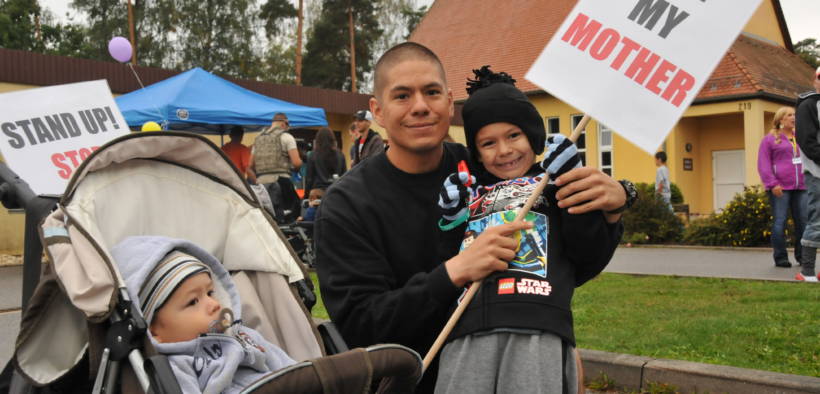Who’s to Blame for Stalled Violence Against Women Act?

Republican and Democrat legislators are at odds over reauthorizing the Violence Against Women Act, known as VAWA, which has been stalled since last January.
Reauthorization of the landmark Violence Against Women Act (VAWA) has stalled again despite efforts by Senator Dianne Feinstein (D-CA) to get the Senate to consider voting on some version of the act last Wednesday, November 20, and the recent introduction of Jodi Ernst’s (R-IA) version of the bill in the Senate.
While a version of VAWA did pass the House last April, the Senate has not taken any action on it. Feinstein’s attempt to get the House version of the measure on the Senate floor was blocked because Senator Joni Ernst (R-IA) has her own version that she introduced to the Senate last Wednesday and she maintains has a better chance of passing the Senate.
Feinstein’s action would have allowed each side to make two amendments to the current version, which would have enabled language from Ernst’s bill to be inserted.
There are currently two main sticking points between the two versions of the measure; a potential change to gun laws, and strengthening protections for Native American women.
The bipartisan VAWA was originally created in 1994 to increase law enforcement efforts, protection, and support for women who have been victims of violence by intimate partners, and has been reauthorized regularly since then. The last reauthorization lapsed this past January.
Gun Violence Against Women
Gun violence against women by intimate partners is an ongoing problem in the U.S., and the link between having access to a gun and femicide has been well established. A 2012 report on Understanding and Addressing Violence Against Women by the World Health Organization (WHO) notes, “Studies consistently show an association between ownership of guns, particularly handguns, and perpetration of intimate femicide.”
The FBI’s most recent homicide data shows that guns are the murder weapon in the vast majority of killings in the U.S. This data also shows that intimate partner murders are not confined to marriage since more people have been murdered by a person categorized as their boyfriend rather than by their husbands. The WHO report goes on to explain, “research has found that stronger gun laws related to men previously cited for or convicted of intimate partner abuse are of particular importance in reducing rates of femicide.”
Preventing people who have a history of committing intimate partner violence from owning firearms seems like a nonpartisan way to help reduce the number of people who are shot by their current or former intimate partners. However, the NRA (National Rifle Association), which has a strong influence on the GOP, rejects this provision.
The previous version of the VAWA took this into account and included a provision barring people from owning a firearm if they have been convicted of spousal abuse or have a restraining order against them by their current or former spouse from owning a firearm. Because this only applied to spouses, it created what has been referred to as the “boyfriend loophole,” which is a significant problem as evidenced by the FBI data noted above.
The House-passed version of VAWA would have closed the loophole and expanded the firearm prohibition to include anyone convicted of violence against women or who have a restraining order from their current or former intimate partner. Ernst’s version lacks this protection.
Violence Against Native American Women
Instances of missing and murdered Native American women have reached crisis levels in the U.S. Native American women experience disproportionately high rates of abuse, abduction, and murder, with the crimes often going unreported. There are several legislative options on the table right now to try and address the problems, and some of them have been incorporated into each version of the VAWA.
The House-passed version of VAWA includes components that increase cooperation between law enforcement agencies on and off reservations. It also would allow Tribal Courts to prosecute non-Native American defendants for domestic violence-related crimes. This is an especially important provision because non-Native Americans commit most violence against Native American women.
This language is not in the Ernst bill, which has drawn some backlash. Her version does include Savanna’s Act, a bipartisan measure that creates very specific guidelines for reporting and responding to cases of missing or murdered Native American women and includes requirements for law enforcement cooperation in these cases.
A recent article in Indian Country Today slammed Ernst’s bill for undermining tribal sovereignty, writing, “The Republican version of the Violence Against Women Act Reauthorization bill threatens the protection of Native people, undermines tribal courts, tribal jurisdiction, and tribal sovereignty all at once. Add for good measure the bill ignores the Indian Civil Rights Act of 1968.”
Where VAWA goes from here remains to be seen. Feinstein and Ernst are the leaders on the bill right now, and both expressed optimism that some version will pass by the end of this year. With just a few weeks left in the legislative calendar that would require some relatively fast movement from the Senate, so there is a good chance more actions will be taken on VAWA soon.







